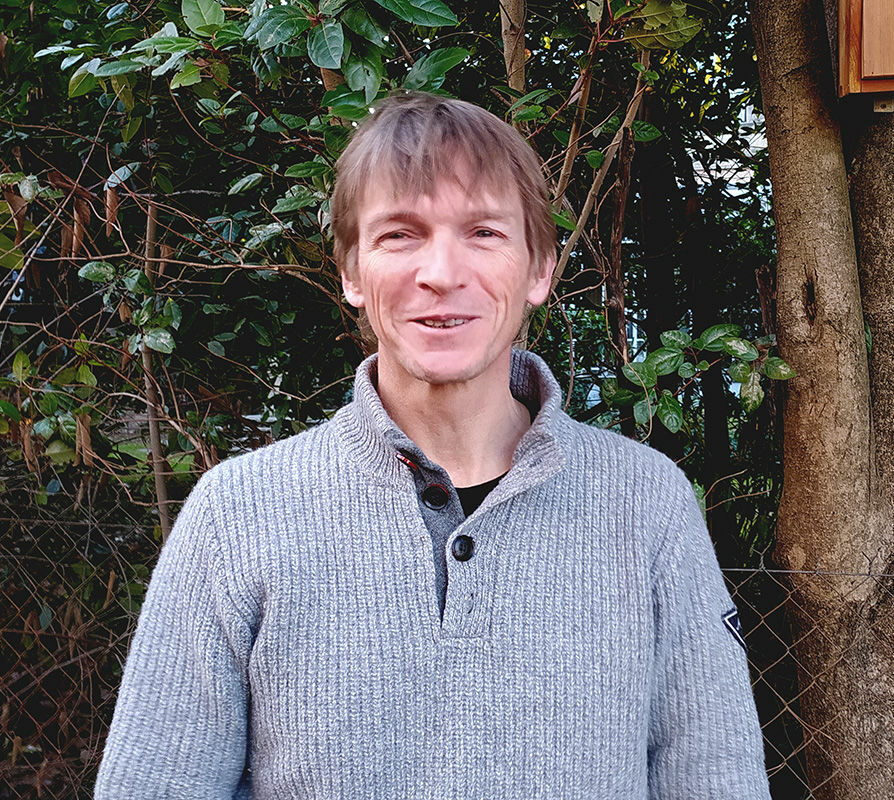Philippe Jarne: Ecologist by nature
The Société française d'écologie et d'évolution has awarded its 2020 Grand Prix to Philippe Jarne, a CNRS researcher at the Centre d'écologie fonctionnelle et évolutive. The award recognizes his research in evolutionary and population biology, invasion biology and ecology. Portrait of a gastropod specialist.

Philippe Jarne and snails go back a long way. A special relationship that began in 1971, on the benches of his CE2 then CM1 class in Chalon-sur-Saône, with two matchmakers: his teachers. " Two eco-friendly teachers who took us every week to observe a pond a few kilometers from the school. We'd find big snails there, and that's probably where I had my first contact with snails," recalls the researcher. " Not only did we observe nature, but we were lucky enough to be able to bring it back to school: bleak, carabid beetles, newts, frogs, turtle-doves and even a garter snake! Our classroom was like a zoo. Two extraordinary years that helped shape a very personal relationship between nature and the child of the time, " always out fishing for pike, carp and catfish ".
Red wire
A relationship with nature was to be the common thread running through the career of the man who describes himself as " an inveterate rural provincial ". By the time he went to high school, Philippe Jarne was interested in biology. And those memories also include a teacher, his biology teacher. " She introduced me to evolutionary biology, whose historical dimension immediately fascinated me ". So, after the baccalauréat, it was off to a preparatory biology course in Toulouse, then to theMontpellier school of agronomy, where he made friends who introduced him to political ecology and immersed him in the naturalist world. With them, the student spent a lot of time observing birds in the Camargue, studying scrubland plants and thinking about politics. By the time his studies at SupAgro came to an end, Philippe Jarne was also certain that the agronomy of the thirty glorious years was not for him.
He discovered his own thing later, when he enrolled for the DEA Biodiversité, écologie, évolution at the Université des Sciences et Techniques du Languedoc, in Professor Louis Thaler's laboratory, with teachers including Pierre-Henri Gouyon and Jacques Blondel. " I realized that I could make evolution my profession - it was a revelation! I immediately said to myself: this is what I want to do ". At first, Philippe Jarne planned to work on birds. But snails came to mind. " Louis Thaler suggested I work on tropical molluscs instead, which is where I first set foot in the tropics, in Côte d'Ivoire and Niger in particular ". Gastropods will also be the focus of his civil service. "Instead, I spent two years at anINRA station on the shores of Lake Geneva, studying snails. Just like at the edge of the pond in CE2...
Special sexuality
In 1990, Philippe Jarne defended his biology thesis under the supervision of Bernard Delay. His subject? " Reproductive systems and population genetic structures in hermaphroditic freshwater gastropods ". He is now a specialist in the particular sexuality of gastropods. " They are hermaphrodites, meaning that they have both sexes in the same individual. My aim was to understand the evolution of their reproduction and to find out how much they allocate to male and female functions.
After completing his thesis, Philippe Jarne moved to the USA to work as a post-doc with Brian and Deborah Charlesworth in Chicago. " The Mecca of evolutionary biology! I learned an enormous amount from the people I worked with, it was an opportunity to make incredible intellectual progress, but also to build up an equally incredible network. This experience was a real career gas pedal ", recalls the researcher who considers himself " extraordinarily lucky ". It was a vein that would not leave him when he returned to France. " In 1992, I passed the CNRS competitive entrance examination and was lucky enough to be appointed directly as a CR1 at the Montpellier Institute of Evolutionary Sciences, at just 29 years of age ". Two years later, the young researcher found himself, thanks to Bernard Delay, " already with a team on my hands; 4 excellent PhD students!
Among them, Patrice David. A partner with whom he has worked closely ever since. " An exceptional researcher, and 28 years of working together without a fight ". The duo is enriched by a third thief, researcher Jean-Pierre Pointier. This triumvirate of evolutionary biologists anchored their work in Martinique and Guadeloupe to study biological invasions and the dynamics of species communities in the West Indies. Physa acuta, a freshwater gastropod of the physidae family, is a particular target. "It's a highly invasive species that originated in North America but is now everywhere ".
From high standards to excellence
Philippe Jarne conducts his research at Cefe, which he joined in 1999 as a member of the Genetics and Evolutionary Ecology team, " a group of people interested in evolutionary ecology and working on the same idea, namely how species are created and evolve. I'm lucky enough to work with some brilliant and friendly people ", says Philippe Jarne, who will be involved in the structuring of ecology research, becoming in turn team director, then department director and finally deputy director of Cefe, before heading the laboratory from 2011 to 2014 and finally the Cemeb labex from 2013 to 2019. Helping people in their careers has been and remains an immense pleasure," stresses the ecologist, who prefers demanding standards to excellence. Everyone contributes to a project to the best of their ability, and the idea is to work with kindness, bringing out the best in everyone. It's from this requirement that excellence is born".
This excellence is now recognized worldwide, as evidenced by Montpellier's second-place ranking in ecology in the 2017 Shanghai ranking. " I'm very lucky to be a researcher in evolutionary biology and ecology in Montpellier, a wonderful center for these fields and a very collective way of doing research that I appreciate.
A shower of awards
The Société Française d'Écologie et d'Évolution awards a grand prize, a research prize and two young researcher prizes each year. In 2020, three of these prizes were awarded to Cefe staff:
- The SFE² 2020 Grand Prize was awarded to Philippe Jarne, for his research in evolutionary and population biology, invasion biology and ecology.
- The SFE² 2020 young researcher prizes were awarded to two former PhD students from the laboratory, Julie Louvrier, who wrote her thesis on "Statistical modelling of the distribution of large carnivores in Europe" under the supervision of O. Gimenez, and Maxime Dubart, who wrote his thesis on "Shellfish: spatio-temporal dynamics of freshwater metacommunities" under the supervision of P. David and P. Jarne.
The winners will present their work at the SFE2 AGM in January 2021.
